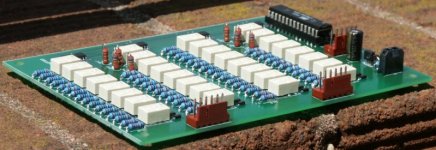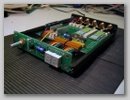Banned
Joined 2002
Damedged2002 said:Hi JWB,
That's a pretty nice project you're doing. I'm curious if you have tested out the boards to see how it sounds during the volume adjustment. Are there any noticable clicks from the relays opening and closing?
Don
These Omron microminiature relays are quite loud. There is a clearly audible zip as you go up or down. If you need quiet relays, you would use Coto. They are almost inaudible, but also about twice as large.
JWB,
I plan on building a stepped attenuator in the future. Instead of relays, I plan on using analog audio switches (Analog Devices SSM2404 Quad Audio Switch, if I can find them). According to the datasheets, these switch without the pops, etc. Have you experimented with these?
If you're interested in checking them out, here's the link to the datasheet.
http://www.analog.com/productSelection/pdf/ssm2404.pdf
Don
I plan on building a stepped attenuator in the future. Instead of relays, I plan on using analog audio switches (Analog Devices SSM2404 Quad Audio Switch, if I can find them). According to the datasheets, these switch without the pops, etc. Have you experimented with these?
If you're interested in checking them out, here's the link to the datasheet.
http://www.analog.com/productSelection/pdf/ssm2404.pdf
Don
Compact relay attenuator with remote control
Hi,
already a little while ago I also made my own relay attenuator.
It utilizes only 5 tiny relais for a 32-step stereo attenuator.
Besides manual (front knob) control, it simulatenously works with an IR remote control. Next to volume control it can also perform input channel selection (4 extra relays for 4 input channels).
All implemented with a (PIC) microcontroller as only IC.
The design allows connecting multiple boards under a single control, to implement balanced (XLR) designs or multi-channel audio.
You can see my design at: http://jos.vaneijndhoven.net/switchr/design.html
Broader background info and two utilities for dimensioning and analyzing switched attenuators are on:
http://jos.vaneijndhoven.net/switchr/index.html
Happy reading,
and let me know on your feedback!
greetings,
Jos
Hi,
already a little while ago I also made my own relay attenuator.
It utilizes only 5 tiny relais for a 32-step stereo attenuator.
Besides manual (front knob) control, it simulatenously works with an IR remote control. Next to volume control it can also perform input channel selection (4 extra relays for 4 input channels).
All implemented with a (PIC) microcontroller as only IC.
The design allows connecting multiple boards under a single control, to implement balanced (XLR) designs or multi-channel audio.
You can see my design at: http://jos.vaneijndhoven.net/switchr/design.html
Broader background info and two utilities for dimensioning and analyzing switched attenuators are on:
http://jos.vaneijndhoven.net/switchr/index.html
Happy reading,
and let me know on your feedback!
greetings,
Jos
Attachments
Banned
Joined 2002
jwb said:Jos, that looks very nice! How sounds it?
My regret with my first attenuator is that I used 1/4W resistors. I should have used 2W resistors, or Dale, or some other kind of low noise, like you did.
I really appreciate that you share your source code. Thanks a lot.
Why would you want to use bigger resistors ? Why not smaller.. makes no sence to use bigger ones for signal.
The predominant noise in metal film resistors is "contact noise". Higher power ratings have lower contact noise for a given construction and current. A 2W metal film resistor will always have less noise than a 1/4W resistor from the same manufacturer. The contact noise is related to the geometry and the type of material. Better materials (Dale, for example) has less noise. Larger geometries (higher power ratings) also have less noise.
Secondarily, for any given device the thermal noise (Johnson noise) is proportional to temperature. Since a power resistor will be cooler, it will naturally have lower noise.
Thermal noise is also proportional to resistance, which is why you never want a 1M resistor in your audio equipment.
In general, for low noise, use the highest practical power rating, the lowest resistance, and keep currents to a minimum. Lately I've been using all Dale RN65 series.
Secondarily, for any given device the thermal noise (Johnson noise) is proportional to temperature. Since a power resistor will be cooler, it will naturally have lower noise.
Thermal noise is also proportional to resistance, which is why you never want a 1M resistor in your audio equipment.
In general, for low noise, use the highest practical power rating, the lowest resistance, and keep currents to a minimum. Lately I've been using all Dale RN65 series.
I agree with jwb about the resistors. Unfortunately I cannot say that I am experienced with direct listening tests on many different resistor types. However it is clear to me that the 1W Vishay/Beyslag metalfilm that I mostly use, sounds really better than the typical small (1/4W) metalfilm.
Jos
Jos
jwb said:Thermal noise is also proportional to resistance, which is why you never want a 1M resistor in your audio equipment.
As one who has 1M resistors strewn with gay abandon, I think that statement wants qualifying. You wouldn't want a 1M resistor in series with your signal. If it's in parallel, it's shunted by a much lower resistance and is irrelevant. Phew!
- Status
- This old topic is closed. If you want to reopen this topic, contact a moderator using the "Report Post" button.
- Home
- Amplifiers
- Solid State
- Yet another relay attenuator

